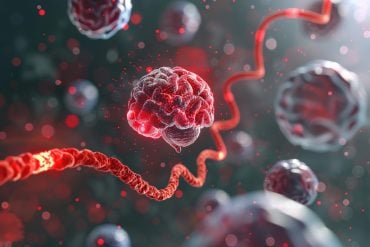Summary: Aggressive and psychopathic individuals have difficulty shedding hostile behaviors once they’ve adopted them, according to new research.
A mathematical model applied to a task assessing hostile responses confirmed this hypothesis. The study, involving 256 volunteers, highlighted identical patterns in both highly aggressive and highly psychopathic subjects.
These findings challenge the prevailing assumptions about distinct mechanisms in aggression and psychopathy.
Key Facts:
- Individuals with high aggression or psychopathic traits find it hard to abandon hostile behaviors, as confirmed by a new study from the University of Barcelona.
- The study used a mathematical model applied to a task measuring hostile responses, offering insights into the cognitive mechanisms involved.
- This research challenges long-held assumptions about separate psychological and neurobiological mechanisms in aggression and psychopathy, suggesting that therapies for one might be effective for the other.
Source: University of Barcelona
People with more aggressive and psychopathic tendencies adopt hostile behaviors quickly, but they find it difficult to abandon these behaviors when they are no longer adaptive or practical.
Although this was already suspected, a study published in Translational Psychiatry confirms this hypothesis for the first time, thanks to an extensive mathematical methodology applied to a task that explicitly measures hostile responses.
The study was led by experts from the Individual Differences Lab (IDLab) research group at the Faculty of Psychology and the Institute of Neurosciences of the University of Barcelona (UBNeuro).
The study applies a mathematical model that unravels which cognitive mechanisms play the most important role in people’s acquisition of these responses. The study, carried out with 256 volunteers, evaluates several aspects related to aggression, hostility, reward and punishment, among others.
Experts from the University of Lübeck (Germany) and the Forensic Psychiatric Center Pompestichting and Radboud University Nijmegen (The Netherlands) have also participated in the study.
A new perspective on aggression and psychopathy
“The most unexpected finding was to identify the same pattern both in people with high aggressiveness, which is characterized by more impulsive tendencies, and in those with high psychopathy, which is defined by more controlled or cold-blooded antisocial behavior,” says Macià Buades-Rotger, first author of the article and lecturer at the Department of Clinical Psychology and Psychobiology of the UB’s Faculty of Psychology.
This finding challenges some long-held assumptions pointing to distinct psychological and neurobiological mechanisms in aggression and psychopathy.
“These two traits, aggression and psychopathy, are similar and obviously correlated, but they are usually assumed to be characterized by distinct psychological and neurobiological mechanisms,” says Professor David Gallardo-Pujol, head of the IDLab.
“The new study, however, reveals that they are actually not so different and that both can lead to the acquisition of hostile behavior through the learning processes,” the authors note.
“Therefore, treatments that work for people with psychopathy, such as emotional regulation training, could potentially work for people with anger management issues. Clearly, studies in clinical samples would be necessary to see if this were the case,” the authors conclude.
About this psychopathy and behavioral neuroscience research news
Author: Macià Buades-Rotger
Source: University of Barcelona
Contact: Macià Buades-Rotger – University of Barcelona
Image: The image is credited to Neuroscience News
Original Research: Open access.
“Aggressive and psychopathic traits are linked to the acquisition of stable but imprecise hostile expectations” by Macià Buades-Rotger et al. Translational Psychiatry
Abstract
Aggressive and psychopathic traits are linked to the acquisition of stable but imprecise hostile expectations
Individuals with hostile expectations (HEX) anticipate harm from seemingly neutral or ambiguous stimuli. However, it is unclear how HEX are acquired, and whether specific components of HEX learning can predict antisocial thought, conduct, and personality.
In an online sample of healthy young individuals (n = 256, 69% women), we administered a virtual shooting task and applied computational modelling of behaviour to investigate HEX learning and its constellation of correlates. HEX acquisition was best explained by a hierarchical reinforcement learning mechanism.
Crucially, we found that individuals with relatively higher self-reported aggressiveness and psychopathy developed stronger and less accurate hostile beliefs as well as larger prediction errors. Moreover, aggressive and psychopathic traits were associated with more temporally stable hostility representations.
Our study thus shows that aggressiveness and psychopathy are linked with the acquisition of robust yet imprecise hostile beliefs through reinforcement learning.







